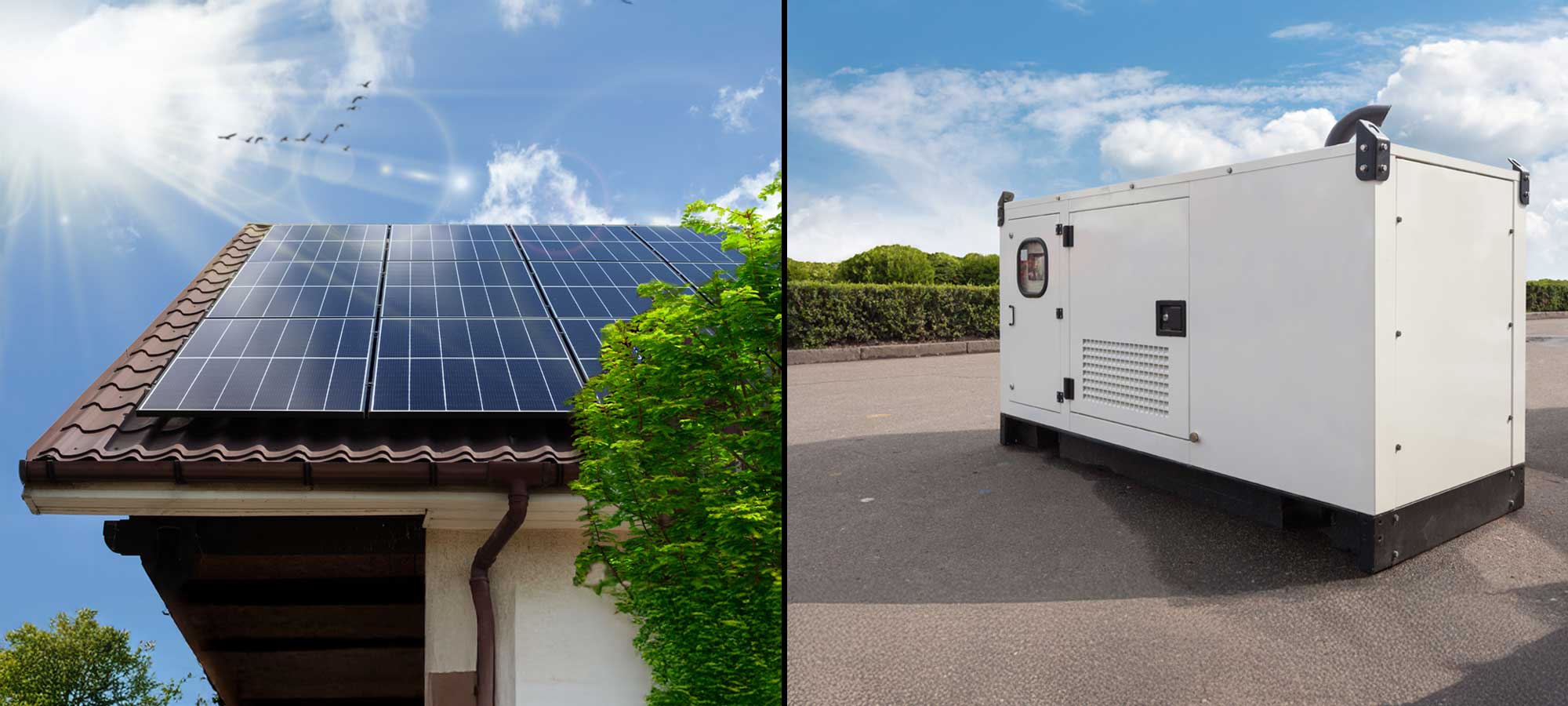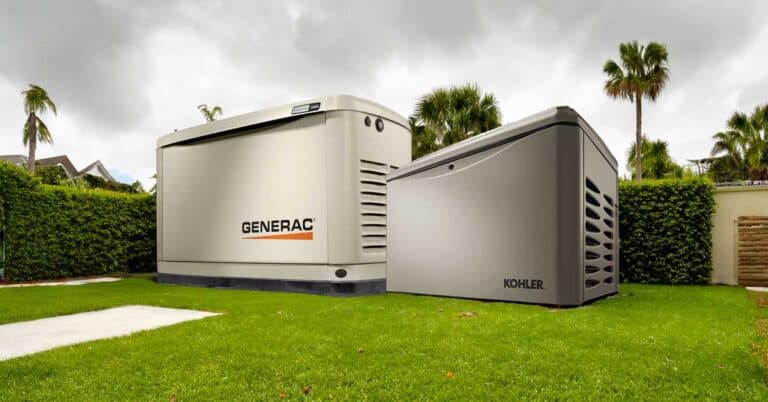Generators vs. Solar: Best Whole House Backup Power
Florida living means power outages aren’t a question of if—they’re a question of when. Tampa Bay homeowners and businesses want whole-house backup power. This is important during summer storms and heat waves. They want to keep life going, even when the lights go out.
Traditionally, generators have been the gold standard for reliable backup power. But advances in solar battery storage are giving property owners new options. To protect your home, medical office, or community clubhouse, it’s important to know the pros and cons of each option.
At Luminous Electric, we specialize in helping customers navigate these decisions. Let’s look at how standby generators, portable units, solar batteries, and hybrid systems compare in cost, convenience, and reliability.
Standby Generators: The Traditional Heavyweight
Standby generators use natural gas or propane. They are the most popular choice for reliable backup power in Tampa Bay.
Key Benefits:
- Automatically detects outages and restores power within seconds
- Runs appliances, lights, HVAC, and critical systems simultaneously
- Capable of handling large electrical loads
- Tied directly to your home or business electrical panel
Installation Considerations:
Installing a standby generator involves:
- Pouring a concrete pad
- Connecting gas lines (natural gas or propane)
- Integrating the generator with your electrical panel via an automatic transfer switch
- Local permitting and potential HOA approval
Cost varies widely, depending on the size and fuel source, but most residential systems fall between $10,000 and $20,000 installed.
Portable Generators: Budget-Friendly, Limited Protection
Though often used in emergencies, portable generators aren’t true whole-house backup power systems. They’re a good temporary solution, but come with major limitations.
Pros:
- Low upfront cost
- Easy to buy at retail stores
- Good for powering a few appliances or lights
Cons:
- Must be manually started
- Requires refueling every few hours
- Cannot run whole-house loads safely
- Carbon monoxide risk if used improperly
- Not suitable for critical commercial operations or HOA clubhouses
Portable generators are helpful for short outages. However, they cannot provide the same seamless protection as a professionally installed standby system.
Solar Panels + Battery Storage: The Renewable Contender
In Tampa Bay’s sunny weather, more property owners are interested in using solar panels with battery storage. They want a sustainable backup power source for their homes.
How It Works:
- Solar panels generate electricity during the day
- Excess power charges a battery (e.g., Tesla Powerwall, Enphase IQ Battery)
- When the grid goes down, your battery supplies power to your home or business
Benefits:
- Clean, renewable energy
- Potential long-term savings on electricity bills
- Virtually silent operation
- Reduces carbon footprint
Challenges:
- High upfront cost (often $15,000–$30,000+ for battery plus solar)
- May not support full whole-house loads unless oversized
- Limited battery capacity during long outages or cloudy periods
- Requires compatible electrical upgrades
- Must comply with permitting, utility interconnection rules, and HOA guidelines
Solar + batteries can be excellent for homeowners with moderate power needs or businesses focused on being environmentally friendly.
But for large commercial buildings or homes that rely on continuous power for HVAC systems, pumps, or medical equipment, solar-only setups might not provide enough backup during an outage.
Hybrid Systems: The Best of Both Worlds?
Some property owners combine generators with solar and battery storage, creating a hybrid solution. For example:
- Solar panels offset everyday energy use
- Battery storage handles short outages or nighttime use
- Standby generator kicks in for extended blackouts
This setup provides ultimate flexibility but requires careful engineering, advanced equipment, and a significant investment. Organizations increasingly use hybrid systems in critical facilities, like medical offices and community centers where power reliability is non-negotiable.
Installation Costs and Electrical System Changes
Comparing costs can be tricky because each solution varies:
- Standby Generators: $10,000–$20,000 installed
- Solar + Battery Systems: $15,000–$30,000+ depending on battery capacity and solar size
- Hybrid Systems: Often $25,000+ because of complexity
Whole-house backup solutions often require:
- Upgraded main electrical panels
- Dedicated transfer switches
- Gas line installation or changes
- Space considerations for batteries or generators
Permitting, Local Codes, and HOA Restrictions
Tampa Bay homeowners must navigate multiple regulations:
- Generators: Require local permits, inspections, and potential HOA approval for placement and noise compliance.
- Solar Batteries: They must follow rules for connecting to the utility grid. They also need to meet roof loading codes. In some neighborhoods, they must follow HOA aesthetic rules.
- Hybrid Systems: Must comply with both generator and solar rules—sometimes requiring complex approvals.
DIY installations can lead to code violations, safety hazards, or voided warranties. Trusting licensed, experienced electricians ensures your system meets all regulations and functions safely.
What Type Fits Your Property?
HOA Clubhouses
- Best Fit: Standby generators or hybrids
- Must handle multiple HVAC zones, lighting, security systems, and commercial-grade appliances during events.
Medical Offices
- Best Fit: Standby generators or hybrids
- Cannot afford power loss for medical devices, patient data systems, or security. Standby systems ensure fast automatic power restoration.
Single-Family Homes
- Best Fit: Depends on priorities
- Solar + battery may suffice for modest loads and eco-minded homeowners. Standby generators remain the gold standard for whole-house coverage and longer outages.
Can I Install My Own Generator?
While it might be tempting to save money, whole-house backup power systems are never a DIY project. Installation involves:
- Working with high-voltage electrical panels
- Gas connections require licensed professionals
- Local permitting and inspections
- Programming and testing transfer switches
Incorrect installation can damage your home’s electrical system, void warranties, or create dangerous safety hazards.
Trust Luminous Electric for Reliable Whole House Backup Power
At Luminous Electric, we proudly install Generac and Kohler standby generators, trusted names for dependable residential and commercial backup power solutions. Our expert team handles everything, from system sizing and permitting to professional installation and ongoing maintenance.
If you’re in need of backup power for your home or business, we’re here to assist you. We’ll help you find the best solution to meet your needs and fit your budget. At this time, Luminous Electric is offering a substantial discount on whole-house generator installations, but this offer is limited in time.

Ready to protect your home or business from Tampa Bay’s next outage?
Contact Luminous Electric today for a consultation about your whole-house backup power options. Reliable power starts with the right plan and the right team.






